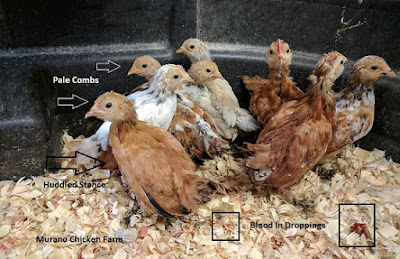Coccidiosis medication is readily available and is water soluble, so it's simple to treat the whole flock at once. (which is absolutely necessary!)
Treating coccidiosis in chicks is as simple as adding the medication to their drinking water for a few days and keeping their brooder clean.
Before we get to the treatment of coccidiosis though, let's talk about what it is and what the symptoms are.
Coccidiosis is a parasitic disease of the intestinal tract of animals caused by coccidian protozoa. The disease spreads from one animal to another by contact with infected feces or ingestion of infected tissue. Site.
Coccidiosis in chicks
Coccidiosis is everywhere and most chickens do have some strain of it living in their intestines, however they have built up an immunity to it.An outbreak of coccidiosis in chicks occurs when they haven't had time to build up an immunity to the disease before they are overwhelmed by it.
When this microscopic parasite multiplies too rapidly for the chick to handle, the parasite damages the tissues. This causes bleeding and prevents the chick from absorbing the nutrients in their food.
The loss of nutrients and blood causes them to weaken and die.
What often happens in a chick brooder is an infected chick poops in the water container which spreads it to the rest of it's brooder mates. Or they poop on the bedding, which gets kicked into the water trough.
Either way it's a quick way to go from one sick chick, to all chicks being infected, which is why you'll want to treat the whole brooder not just the sick chick.
Symptoms of coccidiosis
Affected chicks will become listless and often stand with a sort of huddled up stance almost like they have their shoulders hunched.They kind of look like they're cold and affected chicks tend to huddle together. (see photo)
Affected chicks may be smaller than their brooder mates of the same age and breed.
Chicks will have decreased appetite and their combs may appear pale. In my experience this is often one of the last symptoms before death.
The droppings of an infected chick can be mucus like, bloody or even foamy.
Prevention of coccidiosis
Keep water and feed containers clean. Scrub chick waterers out daily. Not only can dirty water help spread coccidiosis, but the biofilm formed in a dirty waterer can contain e coli and salmonella too.Clean out wet bedding immediately! As long as the bedding isn't wet though, I like to let their brooder go several days without cleaning so they can build up their immunity gradually.
You may need to clean under the waterer more often or elevate it so they can't make a mess. The disease especially thrives in warm, wet conditions so you need to make sure the brooder stays dry.
Make sure your chicks have enough space. Overcrowded brooders will spread coccidiosis quickly.
Since coccidiosis is everywhere your chickens will not become immune to all strains, just the ones on your property.
Care should be taken when visiting other farms or places like poultry auctions where you may come in contact with other diseases and transport them back to your flock on your clothes and shoes!
Related reading: 8 Rules to keep your flock disease free
Treating coccidiosis in poultry
The first thing you'll want to do is to move the affected chickens(s) to a seperate 'hospital care' area to prevent them from spreading coccidiosis to the rest of their flock mates.This might mean you have to set up another brooder just for sick chicks.
There are 2 medications you can buy to treat coccidiosis, Corid and Sulmet. Personally, I only have used Corid as I have not seen stellar results from Sulmet from anyone that I know who has dealt with this.
This is not to say don't use Sulmet, just that I prefer Corid and have seen great results from it.
Corid is the name brand, but the medication is Amprolium. The dose of Corid for treating coccidiosis in poultry is 1 tablespoon of Corid to 5 gallons of drinking water. Give as the only water source for 5 days.
The whole brooder must be treated, not just the affected chicks.
If you are dealing with constant warm, wet conditions you may choose to feed a medicated chick starter.
This feed provides a preventative dose of Amprolium to the chicks daily, but care must still be taken to keep their water clean and remove wet bedding as coccidiosis can still overwhelm their system if it multiplies too quickly!
Treatment for coccidiosis works best when started as soon as possible, so do not hesitate to get started if you believe your chicks have coccidiosis.
After finishing the treatment for coccidiosis in poultry, I like to give them a vitamin supplement like Nutri-drench to help them recover from their illness.
It's a scary disease but with the right treatment, most chicks will recover!
Want to know more about health and illnesses? Click here for my other posts on chicken health!
~L
Want information on raising chickens sent right to your email weekly? Click right here to join my list and get new posts sent directly to you the day they're published ... plus, you'll also get the free download '25 Ways to save money raising chickens'.
I am not a veterinarian or other animal care professional nor do I claim to be. I am simply passing on information that has worked for me and my flock. This information is for entertainment purposes only and is not meant to treat or diagnose any medical condition. Please see a vet if your chicken is ill. Click for my full disclaimer.
This post contains affiliate links. If you chose to purchase something through the link, I will get a small payment from Amazon. It will not affect your purchase price. Click for full disclosure.






No comments:
Post a Comment